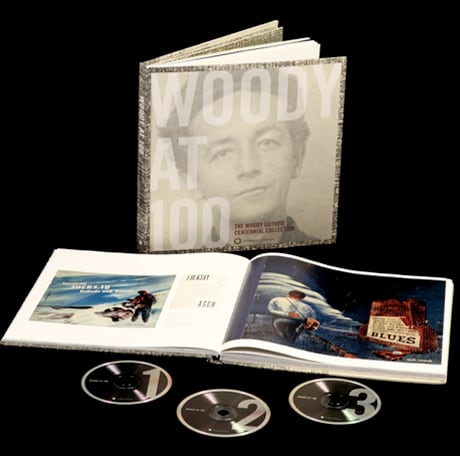My introduction to Woody Guthrie came early, singing "This Land is Your Land" in elementary school, and it was my first lesson in how his music is one of the strongest threads tying North Americans together. From there, Woody's songs became a constant presence in my life, and as with many other people, it grew into a source of truth beyond the reach of music business corruption. Although Woody's iconic status is partly due to his influence on a young Bob Dylan, since his death in 1967, Guthrie's legacy has likewise been a crucial touchstone for the subsequent generation of Americana artists and protest singers. It's entirely fitting, then, that the centennial of Guthrie's birth is being marked with this well-chosen three-disc set of his most important songs, accompanied by a lavishly illustrated 150-page book. Hailing from Oklahoma, Guthrie wasn't the product of an ingrained musical culture, as early blues and country singers were. Guthrie sang about what he observed, and in the '30s, much of that was bleak. As a child of poverty, Guthrie easily stepped into the role of spokesman for the oppressed and downtrodden, eventually finding allies to expand his audience. His detractors labelled him a communist, but songs such as "Hard Travelin'" and "Pastures of Plenty" were a direct reflection of the quest for freedom and equality that had forged America's constitution. At the same time, Woody's often-overlooked sense of humour was just as important to his music, as was his skill at writing children's songs, two things that further endeared him to everyone with whom he crossed paths. There certainly is a great deal more to Guthrie's immense body of work than what is represented on Woody At 100, but apart from some newly discovered recordings that completists will want, this is an ideal package for the uninitiated, and one to be treasured for years to come.
(Smithsonian Folkways)Woody Guthrie
Woody At 100: The Woody Guthrie Centennial Collection

BY Jason SchneiderPublished Jul 9, 2012